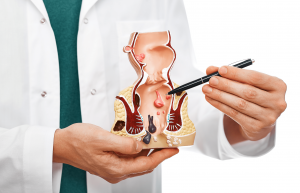Gastroesophageal reflux disease (GERD) continues to be a pervasive health concern among Singaporeans. How long does a GERD flare up or attack last?
We delve into the root cause of this condition, outline its common symptoms here, identify potential triggers, and discuss various treatment options.
Table of Contents
Toggle1. Understanding GERD: How Long Does It Last?

To provide a comprehensive understanding of the duration of mild heartburn and other symptoms associated with GERD, it is essential to grasp the nature of this chronic digestive disorder. Gastroesophageal reflux disease (GERD) is a condition characterised by the backflow of stomach acid and other digestive juices into the oesophagus, leading to various symptoms and potential complications.
GERD occurs in the lower oesophageal sphincter (LES) — the muscular ring where the oesophagus meets the stomach. When the LES doesn’t close as tightly the lining of the oesophagus as it should, the stomach’s acidic contents may flow back or ‘reflux’ into the oesophagus, resulting in a common symptom known as heartburn.
The longevity of GERD in individuals is multifactorial and can be largely influenced by the root cause of the disease and the response to the treatment received. The condition can exhibit a wide spectrum of durations – some individuals might experience significant relief within weeks of initiating treatment, while others might grapple with the situation over an extended period, potentially lifelong.
2. How Long Does A GERD Flare-Up Last?
A ‘flare-up’ or acute episode of GERD can exhibit a broad duration spectrum, from a fleeting few minutes to enduring several hours. Several factors can influence this time frame.
Key among these is the type and quantity of consumed trigger foods or drinks — items like spicy dishes, and certain foods, fried foods, fatty foods, alcohol, and caffeine can exacerbate GERD symptoms. Additionally, individual health factors, such as stress levels and overall physical health, play a crucial role in determining the length of a flare-up.
3. Evaluating The Duration Of A GERD Attack And Its Symptoms
When exploring the duration of a GERD attack, it is crucial to understand the nature of this condition. A GERD attack refers to a period of intensified symptoms, including recurring heartburn, regurgitation, and occasional chest discomfort. These episodes are typically triggered by specific food choices, dietary habits, or stress-inducing circumstances. The duration of a GERD attack can vary, lasting anywhere from a few minutes to several hours.
However uncomfortable the symptoms are, it is worth noting that particularly intense attacks may continue for a more extended period. If you are dealing with persistent or unusually severe symptoms, it is crucial to seek immediate medical attention.
4. Customising Your GERD Management Plan
Understanding the distinct nature of GERD, with the diverse durations of the condition and its flare-ups, it becomes evident that a one-size-fits-all approach to managing chronic conditions would be far from optimal. Effective management of GERD necessitates a bespoke treatment plan tailored to an individual’s unique circumstances and needs.
Such customised strategies could encompass a range of interventions – from lifestyle modifications and medication to more intensive solutions such as surgical procedures in more severe or refractory cases.
Conclusion About GERD Duration And Flare-Ups
It’s vital to remember that the duration of GERD (Gastroesophageal Reflux Disease) flare-ups can vary widely among individuals due to several factors, including the severity of the condition, individual lifestyle habits, diet, and the efficacy of the prescribed treatment.
Some may experience brief episodes lasting a few minutes, while others could suffer from symptoms for several hours or even days. However, the recurrent nature of GERD calls for ongoing management strategies rather than simply focusing on the duration of each flare-up.
If you still struggle with GERD flare-ups and other chronic gastrointestinal conditions, schedule a consultation with Dr Leong, a licenced colorectal surgeon in Singapore. His other fields of expertise include colonoscopy screenings, gastroscopies, hernia surgery, perianal abscess removal, polyps removal, and other colorectal and gastrointestinal procedures.
Click here for more information.
Frequently Asked Questions On GERD Duration And Flare-ups
Is GERD Common In Singapore?
Yes, Gastroesophageal reflux disease (GERD) is quite common in Singapore. As per available statistics, it affects approximately 8.5% of the population. Lifestyle factors like diet, stress levels, and genetic predispositions play a significant role in this prevalence. Additionally, the availability of advanced diagnostic methods, such as laparoscopy, has increased the diagnosis rate, increasing our awareness of GERD’s prevalence in Singapore.
Is GERD A Lifetime Disease?
The duration of GERD can be significantly influenced by the cause of the disease, the effectiveness of treatment, and an individual’s commitment to lifestyle modifications. Some people may experience relief within a few weeks of treatment, while others might grapple with the condition for many years, possibly their whole life; however, with the right management plan, which may include medication, lifestyle changes or, in severe cases, surgical procedures like laparotomy or laparoscopy, the symptoms of GERD can be well-controlled for most individuals.
What Causes A GERD Flare-Up?
Dietary choices play a crucial role in this context. Consumption of spicy or acidic foods, fatty foods, alcohol, and caffeine has been frequently associated with triggering episodes of GERD. Additionally, smoking is a known factor that can exacerbate the condition.
Beyond these, stress has also been identified as a trigger. High-stress levels can affect the body’s functioning, including the digestive system, leading to a flare-up of GERD symptoms. Certain medications, particularly those that affect the function of the lower oesophageal sphincter, can also instigate a GERD episode. Understanding these triggers is fundamental to managing GERD effectively and improving one’s quality of life.
Can A GERD Attack Last For Days?
Yes. In more extreme cases, the discomfort and symptoms associated with GERD can persist for several days.
If you grapple with prolonged or severe symptoms, it’s crucial not to delay seeking medical help. Prompt medical attention is not just about easing immediate discomfort; proper treatment is also vital in preventing potential long-term complications associated with uncontrolled GERD. Your healthcare provider can offer more effective treatment options and advice on managing this chronic condition with over-the-counter medications.
How Can I Manage GERD Effectively?
Healthy lifestyle changes and eating habits such as eating smaller meals, avoiding trigger foods, and maintaining a healthy weight can help. Additionally, your doctor may prescribe medication or recommend surgical procedures.
Can GERD Be Cured Permanently?
While there isn’t a one-size-fits-all cure for GERD, it’s important to stress that the condition can be effectively managed. This strategy often involves a multifaceted approach. Changes in lifestyle, such as dietary modifications, ceasing smoking, stress management, and maintaining a healthy weight, are the foundation of GERD treatment. In addition, over-the-counter medications can be used to control the production of stomach acid and alleviate the symptoms of GERD.
Surgery may be recommended in severe cases of acid reflux or when other treatment options have been unsuccessful. Procedures like laparoscopy can help strengthen the lower oesophagal sphincter and prevent acid reflux, effectively managing GERD symptoms.
What Is The Best Way To Treat A GERD Flare-Up?
Over-the-counter antacids can serve as a quick, temporary remedy for heartburn symptoms, easing the discomfort of a GERD attack. They work by neutralising stomach acid, thus providing prompt relief from symptoms such as heartburn. However, there may be more effective approaches than relying solely on antacids in the broader understanding of GERD.
Can Stress Cause A GERD Flare-Up?
Indeed, stress has been identified as a significant factor that can instigate or exacerbate the symptoms of GERD. When the body is under stress, it reacts in ways that can increase acid production in the stomach, thereby contributing to a GERD flare-up.
Given this connection, incorporating stress management techniques into your daily routine becomes integral to a comprehensive approach to managing and reducing GERD symptoms. This could include mindfulness exercises, regular physical activity, adequate sleep, and a balanced diet. Professional help, such as cognitive behavioural therapy or counselling, might be beneficial in some cases.





